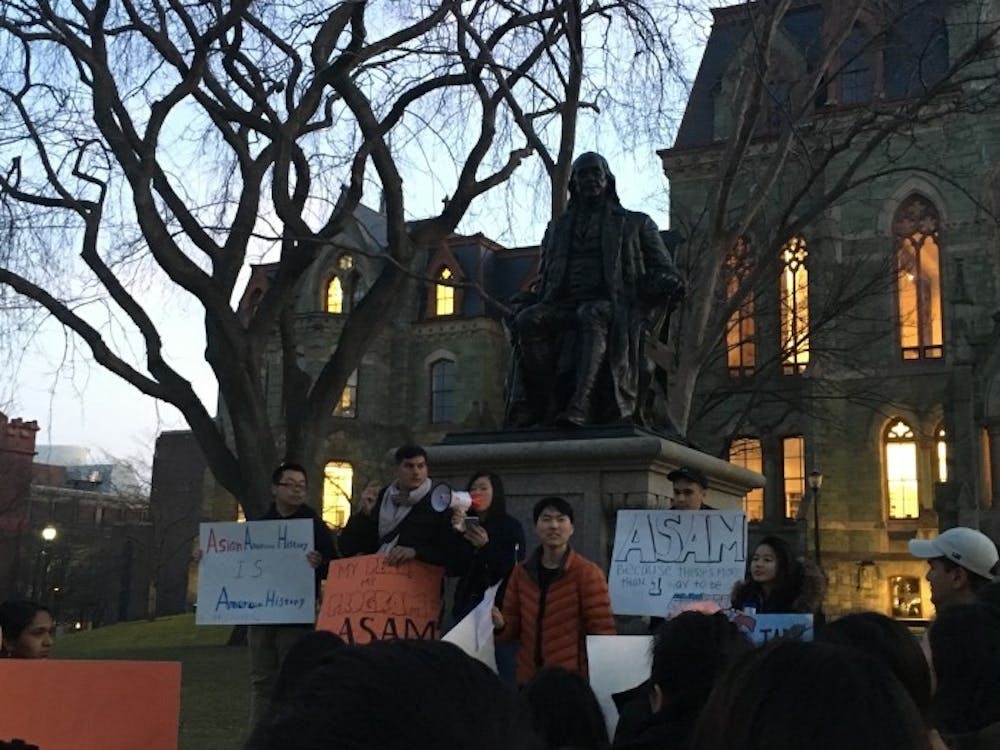On Penn's campus, the topic of Asian-American studies and the importance of the program has grown increasingly prevalent throughout the past year.
Since Grace Kao, former longtime director of the Asian American Studies Program, left to join the faculty at Yale University, protests and efforts to secure the survival of the program have persisted on campus. The program, which Kao helped establish two decades ago and which is now left without a formal director, has also lobbied for funding, support, and more teaching space for courses.
The ASAM program at Penn, however, is not unique in its struggle. Across the Ivy League, institutions have largely struggled to institute structured Asian-American studies programs as well.
Penn and Cornell University are the only Ivies currently offering an independent Asian-American studies minor. Princeton University recently announced the creation of a certificate (the equivalent of a minor) in Asian-American studies, which will be offered for the first time in fall 2018.
Derek Chang, director of Cornell’s AAS program, said that the lack of programming and lack of attention paid to Asian-American studies across the Ivy League is not unique.
"Given their resources, it would be nice if [the Ivies] took leadership,” Chang said.
He added that Cornell is in the process of hiring a new tenured faculty member for the program. He accredited Cornell's decision to start the hiring process to the students who advocated for the hiring of more professors specializing in Asian-American studies.
Anne Cheng, the director of Princeton's American Studies program and an English professor, said the program's expansion also was sparked by student protests and the formulation of a task force to promote Asian-American studies.

At Yale, Mary Lui, a professor in American Studies and History, said there are plans to offer more Asian-American studies classes and find more professors to help guide the program.
Kao, now the faculty director of Education Studies and the director of the Center for Empirical Research on Stratification and Inequality, said she may teach courses in Asian-American studies as well.
“It’s really not possible to have a deep understanding of U.S. society, race, and migration without understanding this population,” Kao said. “It’s an incomplete picture.”
Brown University does not offer any set programs for concentrating (Brown's equivalent of a major) in Asian-American studies. However, students may take courses or choose to concentrate in Ethnic Studies or American Studies with an Asian-American focus, or they may choose to set up their own independent concentration.
Other Ivies offer a range of courses in Asian-American studies, but lack a formal minor.
Dartmouth College's Asian-American studies website states that the school is in the process of developing an Asian-American studies minor under the Asian Studies program.
ASAM Undergraduate Advisory Board member and College senior Lindsey Lui said there have been few advances since last year when College Dean Steven Fluharty agreed to put out an advertisement to hire an Asian-American studies lecturer for three years.
While program leaders fought for the hiring of a tenured professor, English professor and former Director of the ASAM program Josephine Park said there was a compromise with administrators to instead hire a temporary lecturer. Park added that the lecturer would likely be teaching courses by next fall.
Although ASAM leaders said administrators have been open to listening to their concerns, students and professors remain frustrated with the lack of action.
“Administrators may believe they’re giving attention to these programs, but you have to give these programs four times as much attention and support because they’re systematically depressed,” Lui said.
Kao, who advocated for a stronger ASAM program at Penn for over 20 years, said the decision to leave was primarily affected by the resources Yale offered, but also by the administration's lack of cooperation in expanding Penn's program.
“Over the last 10 years or so, there hasn’t been much growth in terms of the resources given to the program,” Kao said. “It was very disheartening after a long time.”
The last time the ASAM board was in contact with administrators was on Nov. 13 with College of Arts and Sciences Dean Paul Sniegowski, and they are currently waiting for a response from Dean of the School of Arts and Sciences Steven Fluharty, who the board emailed on Dec. 21, nearly a month ago.
“Students should work together. There is power in critical mass,” Cheng said. “This is an issue for all of the Ivy League schools.”



